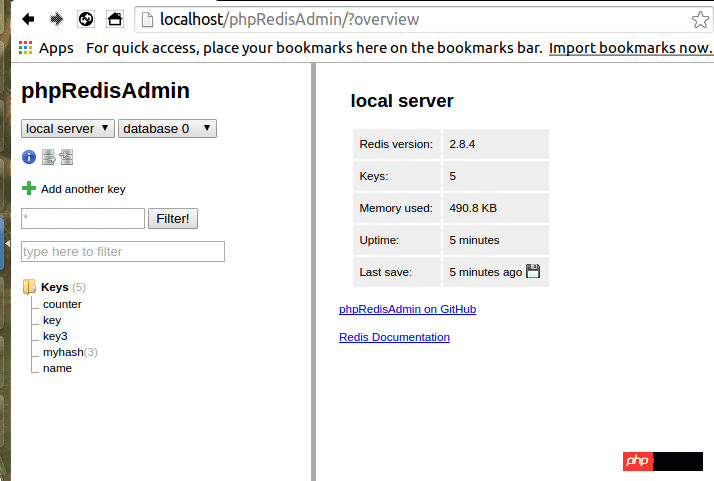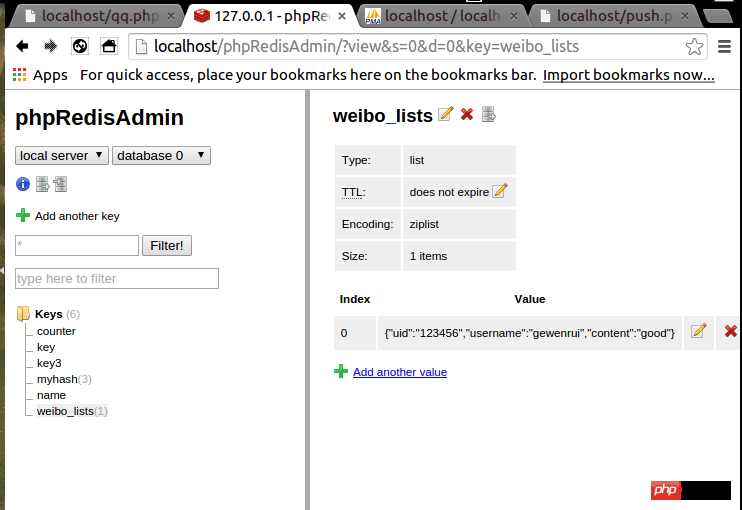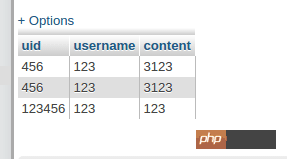 Backend Development
Backend Development
 PHP Tutorial
PHP Tutorial
 Detailed explanation of how PHP publishes Weibo based on Redis message queue
Detailed explanation of how PHP publishes Weibo based on Redis message queue
Detailed explanation of how PHP publishes Weibo based on Redis message queue
This article mainly introduces the method of publishing Weibo in PHP based on the Redis message queue. It analyzes the installation, connection, reading, insertion and other related operation skills of the PHP redis database in the form of examples. Friends in need can refer to the following
phpRedisAdmin:github address Graphical management interface
git clone [url]https://github.com/ErikDubbelboer/phpRedisAdmin.git[/url] cd phpRedisAdmin git clone [url]https://github.com/nrk/predis.git[/url] vendor
First install the above-mentioned Redis graphical management interface, which can conveniently manage Redis Data

In order to reduce the number of Mysql concurrency, first store the user's Weibo in Redis
Assume that the user needs three fields when posting, uid( User ID number), username (user name), content ('user's comment')
For example, the user passes the following information
//此处需要安装phpredis $redis = new Redis(); $redis->connect('127.0.0.1', 6379); // 连接redis $web_info= array( 'uid' => '123456', 'username' => '123', 'content' =>'123' ); //将数组转成json来存储 $list = json_encode($web_info); //lpush向KEY对应的头部添加一个字符串元素 $redis->lpush('weibo_lists',$list); $redis->close(); ///var_dump(json_encode($web_info)); var_dump($list); ?>

Here you can see that our redis already has data
//创建一个PDO数据库链接 data.php
class qq{
public function post($uid='',$username='',$content=''){
try{
$dsn = "mysql:host;dbname=localhost;dbname=test";
$db = new PDO($dsn,'root','root');
$db->exec("SET NAMES UTF8");
$sql ="insert into test(uid,username,content)values('$uid','$username','$content')";
$db->exec($sql);
}catch(PDOException $e){
$e->getMessage();
}
}
}//处理redis数据库的数据 并把数据放到MYSQL数据库中
include "data.php";
$qq = new qq();
$redis = new Redis();
$redis->connect('127.0.0.1', 6379);
//返回的列表的大小。如果列表不存在或为空,该命令返回0。如果该键不是列表,该命令返回FALSE
if($redis -> lsize('weibo_lists')){
//从LIST头部删除并返回删除数据
$info = $redis->rPop('weibo_lists');
$info = json_decode($info);
$qq->post($info->uid,$info->username,$info->content);
}
$redis->close();
var_dump($info);
?>
We can see that the database already has data
The above is the entire content of this article, I hope it will be helpful to everyone's study.
Related recommendations:
PHPFunction date and time function date() detailed explanation_php basics
Summary of php time calculation related issues_php skills
##php stream_get_meta_data return value_php basics
The above is the detailed content of Detailed explanation of how PHP publishes Weibo based on Redis message queue. For more information, please follow other related articles on the PHP Chinese website!

Hot AI Tools

Undresser.AI Undress
AI-powered app for creating realistic nude photos

AI Clothes Remover
Online AI tool for removing clothes from photos.

Undress AI Tool
Undress images for free

Clothoff.io
AI clothes remover

AI Hentai Generator
Generate AI Hentai for free.

Hot Article

Hot Tools

Notepad++7.3.1
Easy-to-use and free code editor

SublimeText3 Chinese version
Chinese version, very easy to use

Zend Studio 13.0.1
Powerful PHP integrated development environment

Dreamweaver CS6
Visual web development tools

SublimeText3 Mac version
God-level code editing software (SublimeText3)

Hot Topics
 1386
1386
 52
52
 How to build the redis cluster mode
Apr 10, 2025 pm 10:15 PM
How to build the redis cluster mode
Apr 10, 2025 pm 10:15 PM
Redis cluster mode deploys Redis instances to multiple servers through sharding, improving scalability and availability. The construction steps are as follows: Create odd Redis instances with different ports; Create 3 sentinel instances, monitor Redis instances and failover; configure sentinel configuration files, add monitoring Redis instance information and failover settings; configure Redis instance configuration files, enable cluster mode and specify the cluster information file path; create nodes.conf file, containing information of each Redis instance; start the cluster, execute the create command to create a cluster and specify the number of replicas; log in to the cluster to execute the CLUSTER INFO command to verify the cluster status; make
 The Future of PHP: Adaptations and Innovations
Apr 11, 2025 am 12:01 AM
The Future of PHP: Adaptations and Innovations
Apr 11, 2025 am 12:01 AM
The future of PHP will be achieved by adapting to new technology trends and introducing innovative features: 1) Adapting to cloud computing, containerization and microservice architectures, supporting Docker and Kubernetes; 2) introducing JIT compilers and enumeration types to improve performance and data processing efficiency; 3) Continuously optimize performance and promote best practices.
 How to clear redis data
Apr 10, 2025 pm 10:06 PM
How to clear redis data
Apr 10, 2025 pm 10:06 PM
How to clear Redis data: Use the FLUSHALL command to clear all key values. Use the FLUSHDB command to clear the key value of the currently selected database. Use SELECT to switch databases, and then use FLUSHDB to clear multiple databases. Use the DEL command to delete a specific key. Use the redis-cli tool to clear the data.
 PHP and Python: Comparing Two Popular Programming Languages
Apr 14, 2025 am 12:13 AM
PHP and Python: Comparing Two Popular Programming Languages
Apr 14, 2025 am 12:13 AM
PHP and Python each have their own advantages, and choose according to project requirements. 1.PHP is suitable for web development, especially for rapid development and maintenance of websites. 2. Python is suitable for data science, machine learning and artificial intelligence, with concise syntax and suitable for beginners.
 PHP vs. Python: Understanding the Differences
Apr 11, 2025 am 12:15 AM
PHP vs. Python: Understanding the Differences
Apr 11, 2025 am 12:15 AM
PHP and Python each have their own advantages, and the choice should be based on project requirements. 1.PHP is suitable for web development, with simple syntax and high execution efficiency. 2. Python is suitable for data science and machine learning, with concise syntax and rich libraries.
 PHP's Current Status: A Look at Web Development Trends
Apr 13, 2025 am 12:20 AM
PHP's Current Status: A Look at Web Development Trends
Apr 13, 2025 am 12:20 AM
PHP remains important in modern web development, especially in content management and e-commerce platforms. 1) PHP has a rich ecosystem and strong framework support, such as Laravel and Symfony. 2) Performance optimization can be achieved through OPcache and Nginx. 3) PHP8.0 introduces JIT compiler to improve performance. 4) Cloud-native applications are deployed through Docker and Kubernetes to improve flexibility and scalability.
 How to read redis queue
Apr 10, 2025 pm 10:12 PM
How to read redis queue
Apr 10, 2025 pm 10:12 PM
To read a queue from Redis, you need to get the queue name, read the elements using the LPOP command, and process the empty queue. The specific steps are as follows: Get the queue name: name it with the prefix of "queue:" such as "queue:my-queue". Use the LPOP command: Eject the element from the head of the queue and return its value, such as LPOP queue:my-queue. Processing empty queues: If the queue is empty, LPOP returns nil, and you can check whether the queue exists before reading the element.
 PHP: The Foundation of Many Websites
Apr 13, 2025 am 12:07 AM
PHP: The Foundation of Many Websites
Apr 13, 2025 am 12:07 AM
The reasons why PHP is the preferred technology stack for many websites include its ease of use, strong community support, and widespread use. 1) Easy to learn and use, suitable for beginners. 2) Have a huge developer community and rich resources. 3) Widely used in WordPress, Drupal and other platforms. 4) Integrate tightly with web servers to simplify development deployment.



